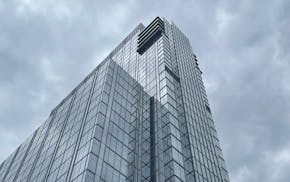The Minneapolis-based Institute for Local Self-Reliance (ILSR), which champions independent small businesses, has been bashing Amazon lately — as has President Donald Trump.
Very strange bedfellows.
ILSR's probing research has criticized Amazon, and a decade ago the likes of Walmart and Target, for grabbing public subsidies to build huge stores and distribution centers in far suburbs that helped shutter neighboring small-town and core-city shops on Main Street.
ILSR has consistently opposed corporate subsidies, while Trump likes them for favored companies.
Trump pans Amazon CEO Jeff Bezos, who also happens to own the Washington Post, publisher of many Trump-critical stories.
But it's tough to knock business-and-wealth builder Bezos.
He started a tiny, Internet-enabled shipping company in 1994 that has become a diversified conglomerate worth $475 billion employing more than 340,000 people that has enriched millions.
Now, Trump is promoting a deal to build a huge Foxconn plant in the Wisconsin congressional district of U.S. House Speaker Paul Ryan. China-based Foxconn makes Apple iPhones and other consumer electronics in Asia.
Foxconn has agreed with Wisconsin Gov. Scott Walker to build a $10 billion electronics plant that could create as many as 13,000 jobs over many years at an estimated public subsidy of $3 billion, or $230,000 per job.
This one has the potential to be a huge public giveaway compared to anything Bezos has done.
The Wisconsin plant would open in 2020 with 3,000 employees and make liquid crystal display monitors used in televisions and computers, according to the Chicago Tribune.
The Wisconsin Legislature is considering the $3 billion incentive package that must be passed by September to close the deal.
Some legislators balk over unanswered questions about the tax breaks. Another sticking point is the Walker-proposed idea waiving state environmental permit requirements.
U.S. Rep. Mark Pocan, who represents part of south-central Wisconsin, questioned how many jobs will actually materialize and at what pay.
He's also questioning whether Foxconn might abandon the deal as the Trump plan to raise import taxes — another reason Foxconn would want to manufacture in U.S. — appears headed nowhere in Washington D.C.
Speaker Ryan has called the plan a "game-changer" that "is a really good deal for Wisconsin."
We'll see.
Meanwhile, Amazon has grown from 65,000 employees to nearly 350,000 over the last five years. Those jobs range from $15-an-hour warehouse workers to six-figure software jockeys, including a new 100-employee regional center in Minneapolis.
The Amazon distribution center in Shakopee, which opened in 2015, is headed toward 2,500 employees who start at jobs that pay up to $17 an hour.
Amazon has received since January 2015 at least $241 million in subsidies in the form of property tax abatements, infrastructure improvements and other incentives for distribution centers nationwide, according to Good Jobs First.
The Washington-based group frequently criticizes big business seeking government incentives and, in the process, creating competition between states and local governments.
Amazon's Shakopee center ranked as the 11th-most subsidized Amazon facility in the last two years.
It has received close to $5.8 million in the form of tax-increment financing to pay for road improvements around the new distribution center from the incremental property taxes paid by the plant.
Fair criticism. Still, stakeholders have gotten comparatively good value from the meteoric growth of Amazon.
But so far, Trump's economic development strategy is born more of political gamesmanship and hyperbolic overstatement than economic analysis or consistent policy.

St. Anthony: 'Patient' investing paying off for St. Paul's Hill Capital

Jennifer Smith, leader of Burnsville's Innovative Office Solutions, has died

St. Anthony: Medical professions in Minnesota need more people of color in their ranks



